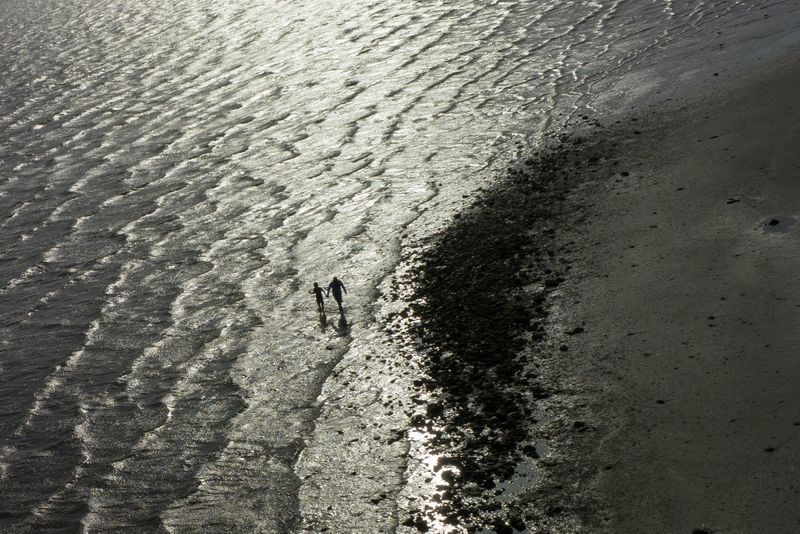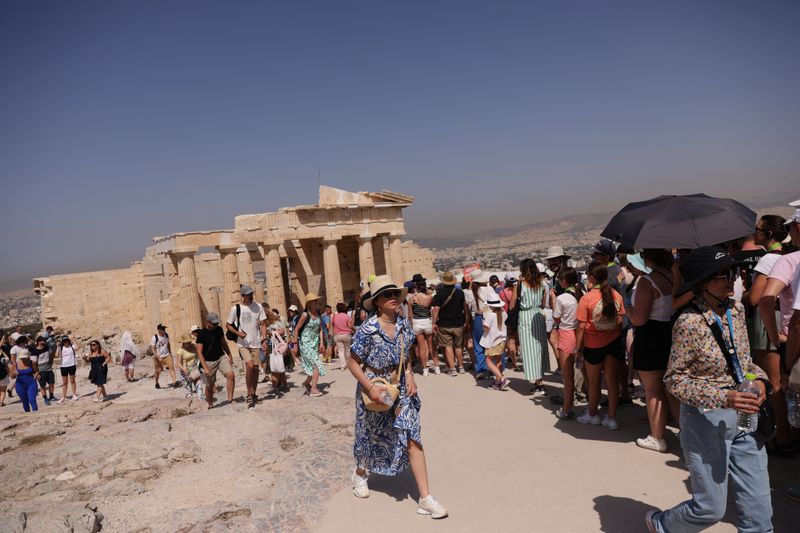By Deborah Kyvrikosaios and Liliana Salgado
ATHENS/PHOENIX (Reuters) - Greece closed the ancient Acropolis during the hottest part of the day on Friday to protect tourists as southern Europe suffered in a fierce heatwave, while more than 100 million Americans also faced a prolonged spell of sweltering weather.
The European Space Agency (ESA), whose satellites monitor land and sea temperatures, has warned that Italy, Spain, France, Germany and Poland are all facing extreme conditions.
Temperatures next week could break Europe's current record - 48.8 Celsius recorded in Sicily in August 2021.
Italian meteorologists have dubbed the next phase of the European heatwave "Charon" - a reference to the ferryman of the souls of the dead in Greek mythology. That succeeds this week's "Cerberus" named after the three-headed dog of the underworld.
The world recorded its hottest day ever last week, with scientists blaming the combination of long-term global warming caused by greenhouse gases, with the short-term boost from El Niño, a regular warm-weather pattern originating in the Pacific.
DEATH, BURNS AND DEHYDRATION
In many places in the Southwest of the United States, where hot summers are the norm, extreme temperatures that could break records are forecast in the coming days.
The city of Phoenix in Arizona has already had 15 days in a row with temperatures exceeding 110 degrees Fahrenheit (43.3 Celsius), with mobile clinics treating homeless people suffering from third degree burns and severe dehydration.
The impact of extreme summer heat has been brought into focus by a study this week that said as many as 61,000 people may have died in the sweltering heat across Europe last summer.
Joan Ballester, a professor at the Barcelona Institute for Global Health, said France had learned lessons from a deadly 2003 heatwave that countries such as Italy, Greece, Spain and Portugal could follow.
"There are measures that are relatively cheap, like for example, coordinating public entities also doing a census of vulnerable populations," Ballester, a co-author of this week's study, said.
"But there are much more expensive measures, like for example, the redesign of cities to improve housing conditions," he told Reuters.
ACROPOLIS NOT NOW
In Athens, with temperatures peaking above 40 Celsius, authorities closed the Acropolis Hill, home to the Parthenon temple that is visited by millions of tourists every year, from noon to 5 p.m. (0900 GMT-1400 GMT).
Huge crowds had earlier formed long queues in the heat to enter the site, many donning hats and fanning themselves, others drinking water and carrying umbrellas. The hill becomes particularly stifling due to its altitude and lack of shade.
One woman seated on the ground was attended to by paramedics after feeling faint. Others were brought down from the Acropolis Hill in golf carts and transferred to wheelchairs.
Greece's civil protection ministry warned of the risk of forest fires in five areas and told people to avoid tasks such as burning weeds for fear of setting off blazes. Wildfires also hit parts of Croatia close to the Adriatic coast.
Doctors warned that poorer elderly people with existing health problems were most at risk.

"They suffer from heart issues, chronic bronchitis, stroke, kidney failure," said Angel Abad, from the office of sustainable development at Madrid's La Paz hospital.
"Most have a low socio-economic background and we know that in these cases people who don't have air conditioning are more vulnerable. They face a higher risk and higher mortality upon arriving at an emergency ward," added Abad, a preventive medicine and public health specialist.
